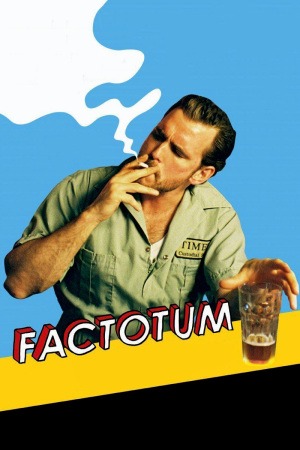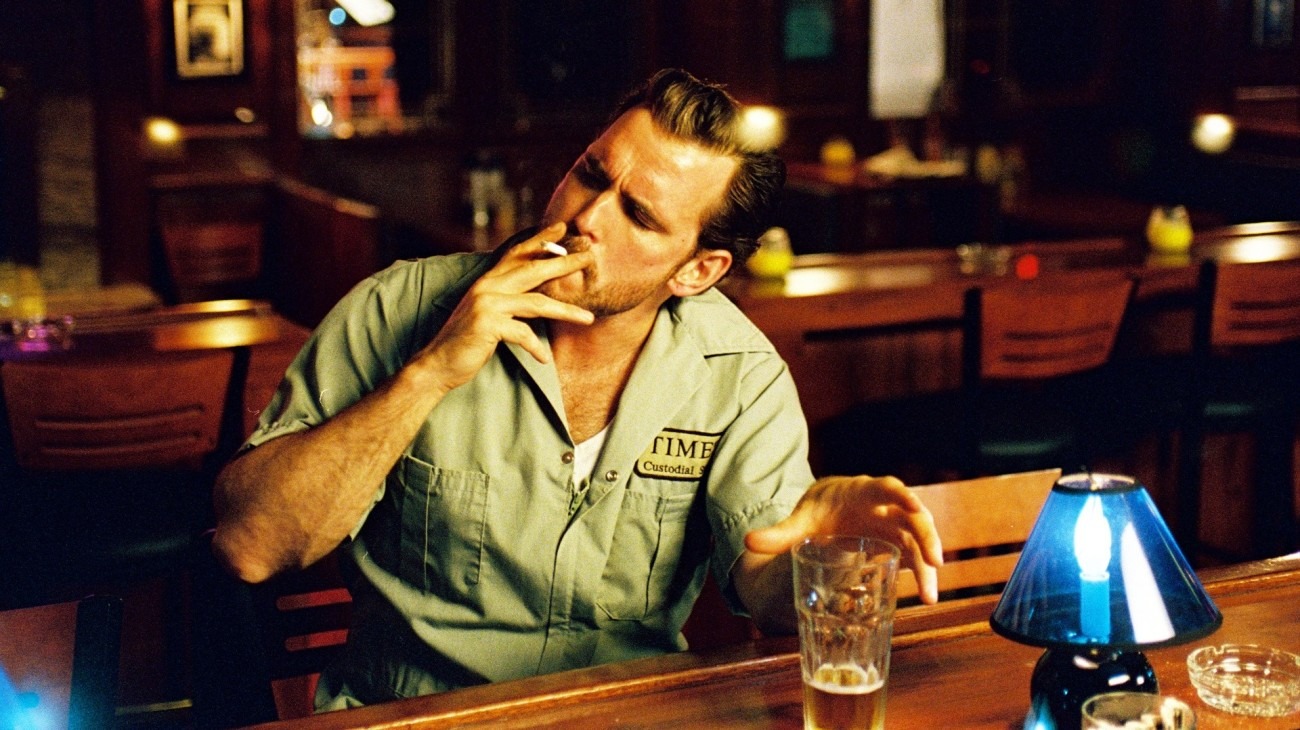
I don't wanna work
I feel somewhat guilty every time I look over the ol' blog for the last few weeks and note how irregularly I've been posting, and how indifferent those posts tend to be. I will not excuse myself but explain this, yet again, as the result of my job - I enjoy writing but I have not yet found a way to eat off of it, and so in the conflict between the work I have to do (and this is a busy period) and the things I enjoy, the latter will always lose.I wouldn't go into all that, but it seems like a nice way to set up Factotum, the recently-released adaptation of the Charles Bukowski novel about a man who does not allow work to get in the way of what he enjoys, which is primarily alcohol.
It's the story of Henry Chinaski (Matt Dillon, in his career-best performance), an educated man with some literary aspiration, who wanders from job to job looking for whatever will allow him to most freedom to avoid actually working while he drinks and writes. I have not read the novel and therefore do not know if it follows the same arc as the film (essentially, Bukowski's own life), but the film posesses an eye for the squalid details of a squalid life that can only really come out of autobiography.
I say "arc," and yet a significant, nay, overriding part of why Factotum works as a story is that virtually nothing happens. A bit of a narrative throughline concerns Chinaski's on-and-off relationship with fellow lowlife Jan (Lili Taylor), but the story functions best when it's merely looking at a slice of life going nowhere. It's in the moments between things that it's most obvious that this is a black comedy.
What's really intriguing is how the visual language of the film follows through on this idea. It was directed and written by Bent Hamer, a Norwegian, and there is a certain "Europeanness" to the look of it. It simply doesn't seem like much effort was put into making it visually adventuresome, and far be it from me to praise a film for having mostly inert cinematography and a sterile mise en scène, but it works here. The slackness of the look mirrors the content of the narrative: Chinaski's life is disaffected and joyless, the film is disaffected and joyless ("joy" here meaning and moving camera, vibrant colors and eye-grabbing lighting). It is the visual analogue to Bukowski's prose: brusque and unpolished, acknowledging that the great bulk of everything is shit.
Which is not to say that it is shoddily-made; I have no doubt that the choice of making the film so arid was deliberate. Too many scenes speak to a director with a very clear sense of what would suck the most energy out the proceedings. In particular I recall one five-minute scene containing one shot, opening with Chinaski puking in the bathroom and returning to bed, followed by Jan doing the same, followed by their first break-up. It's all very flat, as it should be; and to make sure the audience gets that flatness, the camera is mounted on a tripod and occasionally pans a little bit to keep both actors in frame. It would be boring if it weren't so self-conscious, but either way it works for the intended purpose: show how little investment these people have in anything.
The shocking twist: I didn't like Factotum much at all. Not that I think it's meant to be "liked." Perhaps the people who adore Bukowski (I don't, at least not the stories I've read) will be thrilled to see a film that so faithfully recreates his world, but on film at least it's not a very interesting world. People hate their little lives and try to escape them however they can. Yes, and? It's all well and good to hold a mirror up to the squalid world, and Factotum is nothing if not truthful, but that doesn't mean that watching filmmakers be deliberately uninteresting is a fun time. There's little point to a film that dramatizes what I experience every day, the effect if not the particulars. And then the film gets me again: of course there's no point, it's about working life. Which leads to the question: how does one argue against a film whose purpose is to be boring?
6/10
It's the story of Henry Chinaski (Matt Dillon, in his career-best performance), an educated man with some literary aspiration, who wanders from job to job looking for whatever will allow him to most freedom to avoid actually working while he drinks and writes. I have not read the novel and therefore do not know if it follows the same arc as the film (essentially, Bukowski's own life), but the film posesses an eye for the squalid details of a squalid life that can only really come out of autobiography.
I say "arc," and yet a significant, nay, overriding part of why Factotum works as a story is that virtually nothing happens. A bit of a narrative throughline concerns Chinaski's on-and-off relationship with fellow lowlife Jan (Lili Taylor), but the story functions best when it's merely looking at a slice of life going nowhere. It's in the moments between things that it's most obvious that this is a black comedy.
What's really intriguing is how the visual language of the film follows through on this idea. It was directed and written by Bent Hamer, a Norwegian, and there is a certain "Europeanness" to the look of it. It simply doesn't seem like much effort was put into making it visually adventuresome, and far be it from me to praise a film for having mostly inert cinematography and a sterile mise en scène, but it works here. The slackness of the look mirrors the content of the narrative: Chinaski's life is disaffected and joyless, the film is disaffected and joyless ("joy" here meaning and moving camera, vibrant colors and eye-grabbing lighting). It is the visual analogue to Bukowski's prose: brusque and unpolished, acknowledging that the great bulk of everything is shit.
Which is not to say that it is shoddily-made; I have no doubt that the choice of making the film so arid was deliberate. Too many scenes speak to a director with a very clear sense of what would suck the most energy out the proceedings. In particular I recall one five-minute scene containing one shot, opening with Chinaski puking in the bathroom and returning to bed, followed by Jan doing the same, followed by their first break-up. It's all very flat, as it should be; and to make sure the audience gets that flatness, the camera is mounted on a tripod and occasionally pans a little bit to keep both actors in frame. It would be boring if it weren't so self-conscious, but either way it works for the intended purpose: show how little investment these people have in anything.
The shocking twist: I didn't like Factotum much at all. Not that I think it's meant to be "liked." Perhaps the people who adore Bukowski (I don't, at least not the stories I've read) will be thrilled to see a film that so faithfully recreates his world, but on film at least it's not a very interesting world. People hate their little lives and try to escape them however they can. Yes, and? It's all well and good to hold a mirror up to the squalid world, and Factotum is nothing if not truthful, but that doesn't mean that watching filmmakers be deliberately uninteresting is a fun time. There's little point to a film that dramatizes what I experience every day, the effect if not the particulars. And then the film gets me again: of course there's no point, it's about working life. Which leads to the question: how does one argue against a film whose purpose is to be boring?
6/10
Categories: indies and pseudo-indies






